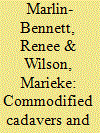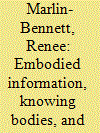| Srl | Item |
| 1 |
ID:
096552


|
|
|
|
|
| Publication |
2010.
|
| Summary/Abstract |
Traveling anatomy exhibitions import plasticized, posed human cadavers and place them on display. We explore the current industry, its history, and the spectacle of anatomy exhibits. The commodification of cadavers is examined as a problem in global political economy. The absence of global rules identifying plastinated cadavers as human remains allows a globalized plastination and exhibition industry. The spectacle of the exhibitions themselves divert attention away from important moral questions about the proper use of human remains and about the provenance of the cadavers used to create plastinates. The absence of global norms and the distraction of spectacle results in a global regime permitting commodification of cadavers.
|
|
|
|
|
|
|
|
|
|
|
|
|
|
|
|
| 2 |
ID:
123589


|
|
|
|
|
| Publication |
2013.
|
| Summary/Abstract |
The turn to materialism emerging in world politics scholarship promises fruitful ways of understanding power and political life by focusing on agency in the physical world. Yet immaterial information and 'the virtual' seem to dominate our lives. How can we understand the relationship between the material and the informational? Does this understanding promise any further insight into agency, power, and world politics? The focus in this paper is on the materiality (corporeality) and information of the human body as a special case. Embodied information is the information contained in the body that can potentially be accessed by others through an act of power. The way in which embodied knowledge is implicated in practices of world politics is exemplified by surveillance, DNA databases, and organ trade. Bodies are also the means by which information becomes sensible: we understand information from various sources and with various kinds of content through our bodies' ability to sense. This knowing body is also implicated in power, as exemplified by the use of sound and the augmentation of the senses through technology. Drawing on the interpretation of embodied information and knowing bodies, this article provides a pragmatic model of world politics in which to control how information flows, how it is extracted from the body, how it is inserted or received, how quickly, and to what end, is to have power or to be powerful.
|
|
|
|
|
|
|
|
|
|
|
|
|
|
|
|